June 3, 2025 | 05:04 GMT +7
June 3, 2025 | 05:04 GMT +7
Hotline: 0913.378.918
June 3, 2025 | 05:04 GMT +7
Hotline: 0913.378.918
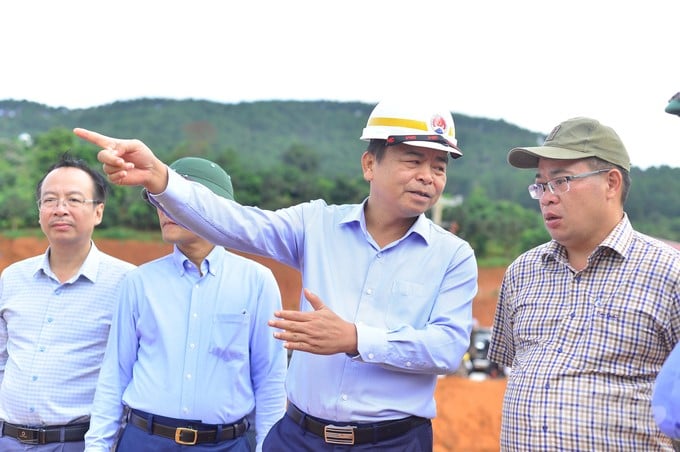
Deputy Minister of Agriculture and Rural Development Nguyen Hoang Hiep (2nd from right) led the delegation of the National Steering Committee for Natural Disaster Prevention and Control to inspect the landslide situation at Dong Thanh reservoir (Lam Ha district, Lam Dong). Photo: Minh Hau.
On August 8, Deputy Minister of Agriculture and Rural Development Nguyen Hoang Hiep led the delegation of the National Steering Committee for Natural Disaster Prevention and Control to inspect the landslide situation at Dong Thanh reservoir (Lam Ha district, Lam Dong) and work with the Lam Dong Provincial People's Committee and authorities on the work of natural disaster prevention and control (NDPC) in the area.
At the Dong Thanh reservoir structure (Lam Ha district, Lam Dong), Deputy Minister Nguyen Hoang Hiep and the delegation listened to functional units of Lam Dong province jointly reporting on the landslide situation. Accordingly, landslides at Dong Thanh reservoir occurred at the beginning of July. The landslide in this area damaged the houses of some households and damaged the spillways and floodways of the project. Specifically, there are 9 affected households in the area, with a total area of over 5.3ha of agricultural land. Among these 9 households, 4 households have their houses affected.
At this structure, Deputy Minister Nguyen Hoang Hiep, experts, and the delegation also viewed soil and rock samples from the drill to grasp information about the stratigraphic structure. The results of geological exploration and research in the area are also reported in detail by functional units, investors, and construction units.
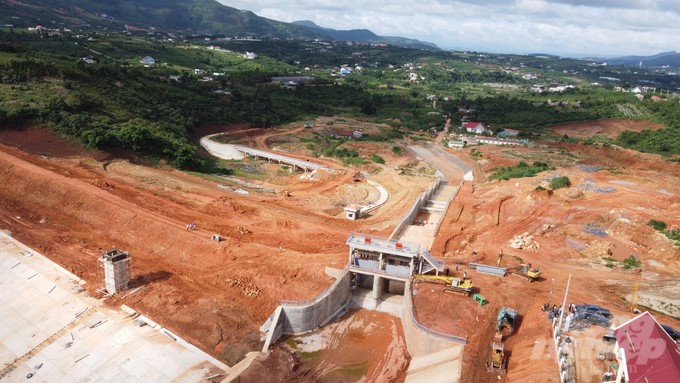
A corner of the Dong Thanh reservoir structure (Lam Ha district, Lam Dong). Photo: Minh Hau.
During the day, Deputy Minister Nguyen Hoang Hiep and the delegation had a working session with the Lam Dong Provincial People's Committee on the NDPC work in the locality. At the working session, Mr. Nguyen Ngoc Phuc, Vice Chairman of the Lam Dong Provincial People's Committee, said that over the past time, the situation of natural disasters and weather in Lam Dong province has developed very complicatedly, with continuous and prolonged heavy rain. This situation made the ground base weak, causing especially serious landslides and slides of construction structures in Da Lat city, Bao Loc city, Lam Ha district, and some other localities in the province. Natural disasters caused great damage to people's lives and the properties of the State and people.
Accordingly, since the beginning of the year, the locality has experienced 13 heavy rains, 1 hail, 6 tornadoes, 7 landslides, etc., killing 9 people and injuring 4. Natural disasters damaged 236 houses and 336 ha of crops, swept away nearly 3,000 poultry and livestock, damaged 7 bridges for people's livelihoods, 2 schools, 4 irrigation structures, and 230m of traffic road landslides. Torrential rains caused local flooding in some places in Da Lat city, Bao Loc city, Da Huoai and Lam Ha districts, etc. The total damage was estimated at over VND 70 billion.
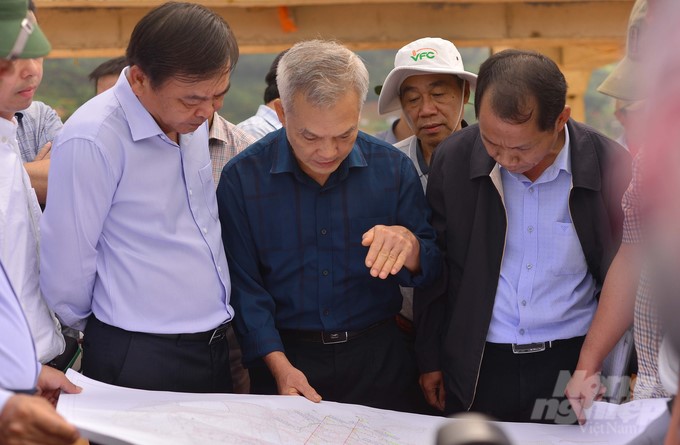
Deputy Minister of Agriculture and Rural Development Nguyen Hoang Hiep (left), experts, and authorities listen to reports on the landslide situation at the Dong Thanh reservoir structure. Photo: Minh Hau.
"Especially in June and July, the rainfall is heavy and prolonged. Particularly on July 29–30, the rainfall at Bao Loc pass reached 196m; some other places in Da Huoai district and Bao Loc city reached 100–190 mm. This made the ground base weak, causing some extremely serious landslides," said Mr. Nguyen Ngoc Phuc.
Regarding the problem of landslides at Dong Thanh reservoir, Dr. Nguyen Chau Lan (an expert in the delegation) identified that the area appeared to have two large landslide frames. In these locations, the Lam Dong Provincial People's Committee organized the relocation of people to safe places.
"The delegation examined drill samples, and in general, there are 2 sliding blocks moving, especially the block on the top, which is sliding down about 3m. Rainfall in this reservoir is not great, even only about 200mm in the whole of July, so the rainfall is not the main cause of landslides," said Mr. Nguyen Chau Lan.
From his perspective, the main cause is the impact of underground currents, which cause the basalt soil below to be soaked with water, leading to instability. The safety factor in the area is lost, and the geology slides soil blocks quite deeply and largely. From that fact, Mr. Nguyen Chau Lan proposed to expand the exploration scope and determine the range of sliding blocks to implement handling measures.

Deputy Minister Nguyen Hoang Hiep and the delegation worked with the Lam Dong Provincial People's Committee. Photo: Minh Hau.
According to Dr. Le Van Hung, the geology of the two dam banks has different structures. The right bank has a clay structure, so it is weaker than the left bank with a basalt soil structure. "Water makes the clay gradually weak and leads to the risk of landslides. Moreover, the rock layer in the structure area is mainly boulders, which is an unsolid type of rock," said Mr. Hung.
Regarding the solution to the problem of landslides at the Dong Thanh reservoir structure, experts all believe that it is necessary to follow the method of "fighting against internal threats and external enemies". Accordingly, fighting "external enemies" means preventing surface water gaps from pouring into the landslide frame and fighting "internal threats" by draining groundwater at the feet and keeping pressure on the soil. At the same time, avoid confusing bedrock with boulders for an effective construction direction.
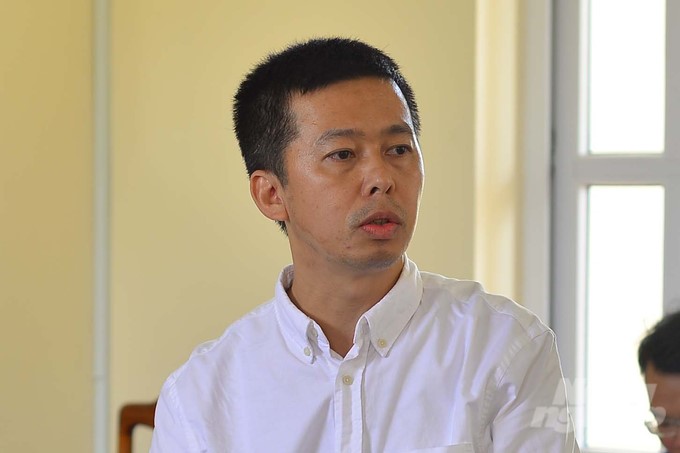
Dr. Nguyen Chau Lan identifies the cause of the landslides at Dong Thanh reservoir. Photo: Minh Hau.
As for the Dong Thanh reservoir structure, Deputy Minister of Agriculture and Rural Development Nguyen Hoang Hiep said that the cause of landslides here is not heavy rain but the formation of landslide frames. Therefore, Deputy Minister Nguyen Hoang Hiep requested the Lam Dong Provincial People's Committee and authorities conduct surveys and exploratory drilling on a large scale to grasp the landslide situation, including upstream exploratory drilling.
"Investors and consulting units must closely coordinate with experts to implement remedial measures," directed Deputy Minister Nguyen Hoang Hiep. At the same time, the Deputy Minister emphasized that Lam Dong must review the construction work on the construction site and take measures to drain surface water and groundwater to avoid landslides. In particular, the implementation of drainage ditches in the downstream area needs to be done immediately. Along with that, Lam Dong needs to discuss with consulting units and experts how to build monitoring points on the dam’s body as well as upstream and downstream of the structure.
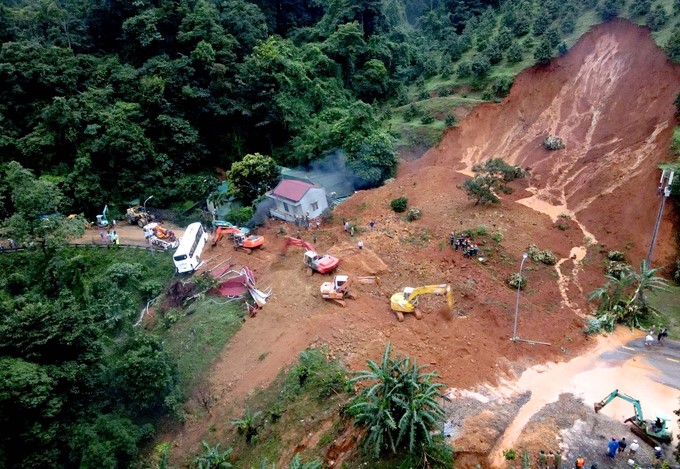
The scene of the landslide on Bao Loc pass on July 30 that killed 3 traffic officers and 1 resident.
Regarding the general landslide problem in Lam Dong in recent times, the Deputy Minister asked this locality to clearly identify 163 landslide points and use the local reserve budget to handle it immediately. The handling of these points is based on the sense of ensuring people's lives and property safety.
"In case the locality faces problems, it is necessary to report them to the Steering Committee so that the Committee will report to the Central and propose handling solutions," emphasized Deputy Minister of Agriculture and Rural Development Nguyen Hoang Hiep. According to the Deputy Minister, Lam Dong is the country's largest high-value agricultural development locality, so the entire development strategy must be integrated with natural disaster prevention and control. The province will soon hold a conference on this issue to discuss solutions for the landslide situation.
Translated by Huyen Vu Thu

(VAN) VAAS and numerous Vietnamese enterprises have signed cooperation agreements with Japanese partners to promote agricultural technology and trade connectivity.
/2025/05/29/5625-12-214801_567.jpg)
(VAN) Provincial mergers in the Mekong Delta promise to streamline administration, expand inter-provincial raw material areas, and foster close linkages in agricultural value chains, benefiting both businesses and cooperatives.

(VAN) Merging Mekong Delta provinces contributes to the expansion of agricultural raw material areas, addressing previous constraints caused by provincial boundaries. Additionally, this expansion will reduce costs and strengthen linkages between businesses, cooperatives, and farmers.
/2025/05/29/1043-2-153730_145.jpg)
(VAN) The Government's policy to merge provincial-level administrative units opens up major opportunities for the Mekong Delta region to reshape its agricultural development strategy toward large-scale production, effective regional linkages, and sustainability.

(VAN) The mutual export of agrifood products between the European Union (EU) and the United Kingdom (UK) must occur again without certification, border controls or other red tape. This was agreed at the UK-EU summit.
/2025/05/22/5121-2-173645_677.jpg)
(VAN) NBSAP Tracker identifies strengths and areas for improvement in the National Biodiversity Strategy, based on each region’s priorities and capacities.

(VAN) The draft amendment to the Circular on rice export trading stipulates a periodic reporting regime for rice exporting enterprises.